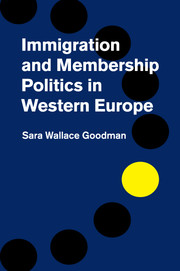Crossref Citations
This Book has been
cited by the following publications. This list is generated based on data provided by Crossref.
Baldi, Gregory
and
Goodman, Sara Wallace
2015.
Migrants into Members: Social Rights, Civic Requirements, and Citizenship in Western Europe.
West European Politics,
Vol. 38,
Issue. 6,
p.
1152.
Goodman, Sara Wallace
2015.
Conceptualizing and Measuring Citizenship and Integration Policy.
Comparative Political Studies,
Vol. 48,
Issue. 14,
p.
1905.
Bloemraad, Irene
2015.
Theorizing and Analyzing Citizenship in Multicultural Societies.
The Sociological Quarterly,
Vol. 56,
Issue. 4,
p.
591.
Kymlicka, Will
2015.
Solidarity in diverse societies: beyond neoliberal multiculturalism and welfare chauvinism.
Comparative Migration Studies,
Vol. 3,
Issue. 1,
Goodman, Sara Wallace
and
Wright, Matthew
2015.
Does Mandatory Integration Matter? Effects of Civic Requirements on Immigrant Socio-economic and Political Outcomes.
Journal of Ethnic and Migration Studies,
Vol. 41,
Issue. 12,
p.
1885.
Merolli, Jessica L.
2016.
Manufacturing desire and producing (non-)citizens: integration exams in Canada, the UK and Netherlands.
Citizenship Studies,
Vol. 20,
Issue. 8,
p.
957.
Joppke, Christian
2016.
Terror and the loss of citizenship.
Citizenship Studies,
Vol. 20,
Issue. 6-7,
p.
728.
Xhardez, Catherine
and
Winant, Ben
2016.
Integratie van nieuwkomers in Brussel: een institutionele en politieke puzzel.
Brussels Studies,
Xhardez, Catherine
2016.
L’intégration des nouveaux arrivants à Bruxelles : un puzzle institutionnel et politique.
Brussels Studies,
Xhardez, Catherine
and
Corrigan, Jane
2016.
The integration of new immigrants in Brussels: an institutional and political puzzle.
Brussels Studies,
O’Brien, Peter
2016.
Counter-terrorism in Europe: the elusive search for order.
European Security,
Vol. 25,
Issue. 3,
p.
366.
Jensen, Kristian Kriegbaum
Fernández, Christian
and
Brochmann, Grete
2017.
Nationhood and Scandinavian naturalization politics: varieties of the civic turn.
Citizenship Studies,
Vol. 21,
Issue. 5,
p.
606.
Alarian, Hannah M.
and
Goodman, Sara Wallace
2017.
Dual Citizenship Allowance and Migration Flow.
Comparative Political Studies,
Vol. 50,
Issue. 1,
p.
133.
Simonsen, Kristina Bakkær
2017.
Does citizenship always further Immigrants’ feeling of belonging to the host nation? A study of policies and public attitudes in 14 Western democracies.
Comparative Migration Studies,
Vol. 5,
Issue. 1,
Light, Michael T.
2017.
Punishing the “Others”.
European Journal of Sociology,
Vol. 58,
Issue. 1,
p.
33.
Ziller, Conrad
and
Goodman, Sara Wallace
2017.
The Effects of Local Government Performance on Anti-Immigrant Violence and Attitudes.
SSRN Electronic Journal ,
Bloemraad, Irene
and
Sheares, Alicia
2017.
Understanding Membership in a World of Global Migration: (How) Does Citizenship Matter?.
International Migration Review,
Vol. 51,
Issue. 4,
p.
823.
Orgad, Liav
2017.
Naturalization.
SSRN Electronic Journal ,
Bech, Emily Cochran
Borevi, Karin
and
Mouritsen, Per
2017.
A ‘civic turn’ in Scandinavian family migration policies? Comparing Denmark, Norway and Sweden.
Comparative Migration Studies,
Vol. 5,
Issue. 1,
Fortier, Anne-Marie
2017.
The psychic life of policy: Desire, anxiety and ‘citizenisation’ in Britain.
Critical Social Policy,
Vol. 37,
Issue. 1,
p.
3.



